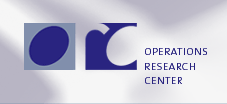|
|
 |
 |
Spring 2005 Seminar Series
MASSACHUSETTS INSTITUTE OF TECHNOLOGY
OPERATIONS RESEARCH CENTER
SPRING 2005 SEMINAR SERIES
DATE: Thursday, February 10, 2005
LOCATION: E40-298
TIME: 4:15pm
Reception immediately following in the Philip M. Morse Reading Room, E40-106
SPEAKER:
Stefanos A. Zenios
Associate Professor of Operations, Information, and Technology
Graduate School of Business
Stanford University
TITLE
Recipient Choice Can Address the Efficiency-Equity Trade-Off in Kidney Transplantation: A Mechanism Design Model
ABSTRACT
In kidney allocation, transplant candidates may have private information about their propensity to enjoy good outcomes after transplantation or about their relative expected improvement in quality of life after transplantation. This paper develops a mechanism design model to investigate the effect of such information asymmetry on the kidney allocation system. In this model, there are n transplant queues corresponding to n candidate types. Candidate types are only observed by the candidates, and each candidate chooses the queue to join by reporting a type. Kidneys have heterogeneous types and each kidney will be assigned to one of the queues depending on its type. Candidates report their type strategically to join the queue that maximizes their utility. Candidate utility depends on the type of kidney received and the expected waiting time, which is calculated using liquid approximations. We consider two alternative social welfare functions: aggregate utility (emphasizing efficiency) and minimum utility across all candidates (emphasizing equity). The kidney allocation problem is to divide the organ supply among the different queues so that social welfare is maximized, and this problem is solved explicitly under both objective functions. There are three findings: (i) The allocation mechanism induces truth-telling by ensuring that candidates who wait longer receive better kidneys; (ii) Information rents are earned by high-risk candidates under the efficiency objective and by low-risk candidates under the equity objective. (iii) A choice-based kidney allocation system in which candidates choose the type of queue to join leads to outcomes in the middle of the equity-efficiency spectrum.
Joint work with Xuanming Su.
Back to Seminar Series schedule page
|
 |
 |
 |
|


